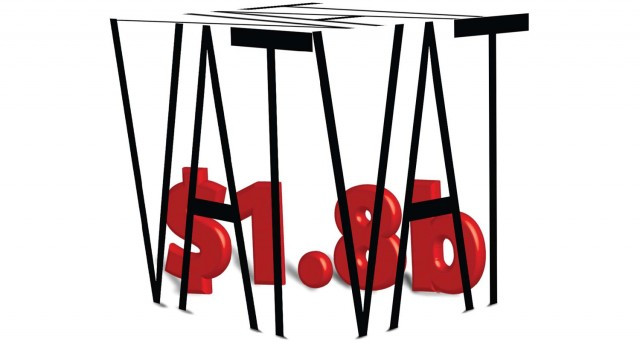IMF links next loan tranche to levy of VAT

The IMF on Wednesday released its staff assessment report based on talks held between the Fund and Pakistan in February in Dubai. Next round of talks on Pakistan’s economy will be held in August which will pave the way for the release of thesecond last tranche of the $11.3 billion loan programme.
The review of the economy was originally scheduled for June but could not take place due to delay in introduction of VAT bills in national and provincial assemblies.
The IMF said a parallel ‘sales tax on service’ bill introduced by the Sindh government was posing a risk to the timely passage of the VAT bill and consistency of the VAT package.
Pakistan is making progress on technical preparation for the implementation of VAT from July 1. “Key steps remaining include procuring information technology and supporting equipment (including managing refunds) and stepping up staff training at the Federal Board of Revenue,” the IMF said.
“Next year’s budget must be consistent with the principles of macroeconomic stability and public debt sustainability, taking into account the liabilities stemming from quasi-fiscal operations,” advised the IMF to the government.
A finance ministry official, who deals with the IMF, said the Fund has implicitly asked the government to maintain tight fiscal and monetary policies instead of easing them. The other message was to set a realistic budget deficit target, he added.
The IMF further said an agreement on the 2010-11 budget and supporting macroeconomic framework was also needed to establish quantitative performance criteria for end-September, which will constitute a condition for the sixth review and release of the final tranche.
The IMF warned that poverty has again started increasing after declining to 17.2 per cent in 2007-08. “Economic slowdown and the erosion of purchasing power caused by inflation suggest that gains in poverty reduction may have been partly reversed.”
Results of the 2007-08 household survey indicated that poverty had already started rising towards the end of that fiscal year.
The IMF also expressed its dissatisfaction over the slow pace of social spending under the Benazir Income Support Programme. “Spending will likely be below the budgeted amount and one-fifth of it will be delivered to the beneficiaries identified before the scorecard was introduced.”
The IMF has already expressed its reservations about transparency of the old distribution system.
The IMF again projected that Pakistan’s economy would grow by three per cent. However, the National Economic Council has approved a controversial growth rate of 4.1 per cent and the same number is being published in the Economic Survey of 2009-10.
Published in the Express Tribune, June 2010.



















COMMENTS
Comments are moderated and generally will be posted if they are on-topic and not abusive.
For more information, please see our Comments FAQ